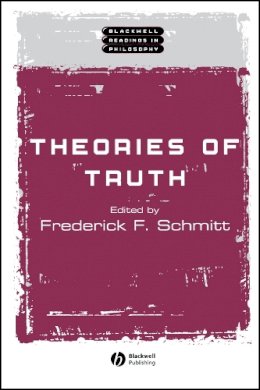
Stock image for illustration purposes only - book cover, edition or condition may vary.
Description for Theories of Truth
Paperback. Philosophers have long debated the nature of truth. The classic and contemporary articles in this collection represent the four most influential theories to emerge from their debates: correspondence, pragmatist, coherence and deflationary theories. Editor(s): Schmitt, Frederick F. Series: Blackwell Readings in Philosophy. Num Pages: 336 pages, 5. BIC Classification: HPK. Category: (P) Professional & Vocational. Dimension: 228 x 152 x 25. Weight in Grams: 498.
The classic and contemporary readings in this collection represent the four most influential theories of truth – correspondence, pragmatist, coherence, and deflationary theories.
- A collection of classic and contemporary philosophical reflections on the nature of truth.
- Opens with an introduction to theories of truth, designed for readers with little or no prior knowledge of the subject.
- Divided into four sections on the most important theories of truth - correspondence, pragmatist, coherence, and deflationary theories.
- Brings together articles in the recent debate over the correspondence theory and deflationism that are not otherwise available in one place.
- Includes contributions by C.S. Peirce, William James, Bertrand Russell, ... Read more
- Concludes with an extensive bibliography of recent articles on truth.
Product Details
Format
Paperback
Publication date
2003
Publisher
John Wiley and Sons Ltd
Condition
New
Series
Blackwell Readings in Philosophy
Number of Pages
336
Place of Publication
Hoboken, United Kingdom
ISBN
9780631222170
SKU
V9780631222170
Shipping Time
Usually ships in 7 to 11 working days
Ref
99-50
About Schmitt
Frederick F. Schmitt is Professor of Philosophy at Indiana University. He is the author of Knowledge and Belief (1992), Truth: A Primer (1995), and the editor of Socializing Epistemology (1994) and Socializing Metaphysics (2003).
Reviews for Theories of Truth
"Theories of Truth contains a judicious set of readings representing the core positions in the field together with a critical introduction that is comprehensive, balanced, and penetrating. This will be an enormously useful reader." Alvin I. Goldman, Rutgers, The State University of New Jersey
